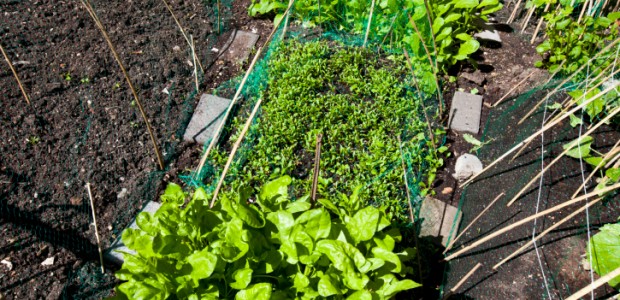After spending hours tilling and planting the garden, the last thing you want is for all of your plants to become pest infested and/or covered in fungus or powdery mildew. Applying pesticides will add harmful chemicals to your crops, the soil and future plantings as well as effect the flavor of your fruits and vegetables. There are a range of safe and natural things you can do to keep your current and future garden healthy.
Start With the Soil
The soil is the first place to begin controlling disease and insects in an organic garden. Using soil that is full of organic nutrients and matter will help your plants thrive and produce a healthy, productive crop. Insects and diseases thrive off of injured and weak plants, but when they are strong and healthy, garden plants have an ability to change their chemistry naturally in order to defend against its enemies. Things you can do to strengthen the soil include:
- Adding compost materials to the soil before planting. Items such as egg shells will provide natural nutrients to the soil.
- Always mulch the surface of the garden to help suppress weeds, protect soil erosion, increase earthworm activity and prevent slugs and snails from taking over. Leaves, straw, pine needles and grass clippings make excellent mulch for a garden.
Prevent Fungus
The best way to fight fungus in the garden is by using natural items you probably already have in the kitchen. These simple remedies will help to safely and naturally keep out common problems, such as fungus and disease.
- Apple cider vinegar is excellent for treating a range of plant diseases, such as black spots and powdery mildew. In a spray bottle, mix 3 tablespoons of apple cider vinegar with 2 quarts of water. Spray the infected plants with the solution when the temperatures are the coolest, such as in the morning or early evening. Avoid spraying the plants when there is direct sunlight on them and repeat daily until the condition is cured.
- Milk is an ideal virus and fungus fighter for the garden. To prevent fungus, simply sprinkle a few tablespoons of powdered milk in the soil before planting. If you notice fungus on the leaves of plants, spray a mixture of equal parts of milk and water (1-cup milk and 1-cup water) directly on the infected leaves.
- Baking soda is an excellent treatment for plant fungus. In a spray bottle, mix 1 tablespoon vegetable oil, a few drops of liquid, biodegradable dish-washing liquid and 1 tablespoon of baking soda. Spray the infected plants, including the base of the plant and the underside of leaves.
To help keep your garden healthy year after year, it is important to rotate the crops. Avoid overwatering plants, especially if you are noticing fungus or mildew. An excellent way to improve the health of your garden as well as try new garden foods, is with companion planting. Companion planting simply means arranging plants that are beneficial for each other. For example, planting a strong smelling herb near the vegetables will prevent insects from smelling the vegetable plants.
~Rene W.
